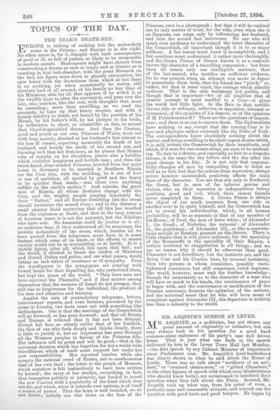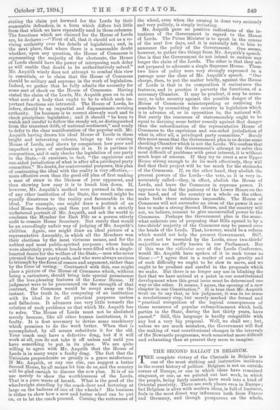MR. ASQUITH'S SPEECH AT LEVEN.
MR. ASQUITH, as a politician, has not shown any great amount of originality or initiative, but one may always look to his speeches for a good hard, common-sense statement of his party's case well driven hotne. That is just what one finds in the speech delivered by him in the Leven Town Hall last Monday, —the first speech by any Cabinet Minister of importance since Parliament rose. Mr. Asquith's level-headednek s was clearly shown in what be said about the House of Lords. There was no talk about "accidents of an acci- dent," or "ermined obstructors," or "gilded Chambers," or the other figures of speech with which even Gladstonians who should know better, are accustomed to interlard their speeches when they talk about the Peers. Instead, Mr. Asquith took up what was, from his point of view, a perfectly sane and reasonable attitude, and argued out the question with good taste and good temper. He began by stating the claim put forward for the Lords by their reasonable defenders, in a form which differs but little from that which we have repeatedly used in these columns. The functions which are claimed for the House of Lords are, he declares :—" First of all, that it should act as a re- vising authority over the details of legislation ; and, in the next place, that where there is a reasonable doubt whether, upon any question, the House of Commons is representing the majority of the electorate, the House of Lords should have the power of interposing such delay as will enable that doubt to be authoritatively solved." Mr. Asquith wisely does not attempt to combat this view in essentials, or to claim that the House of Commons should be solitary and supreme in the work of legislation. Indeed, we gather that he fully admits the necessity for some sort of cheek on the House of Commons. Having stated the claim of the Lords, Mr. Asquith goes on to ask what sort of a body that ought to be to which such im- portant functions are intrusted. The House of Lords, be infers, should be an impartial and dispassionate revising authority. Its business is to correct slovenly work and to check precipitate legislation ; and it should "be keen to watch and careful to follow the steady set, as distinguished from the transient drift, of national sentiment," and ready to defer to the clear manifestation of the popular will. Mr. Asquith having drawn his ideal House of Lords in these bright and interesting colours, brings up the existing House of Lords, and shows by comparison how poor and imperfect a piece of mechanism it is. It is partisan in composition, and it only checks the legislation of one party in the State,—it exercises, in fact, "the capricious and one-sided jurisdiction of what is after all a privileged party committee." No doubt, for controversial purposes, this plan of contrasting the ideal with the reality is very effective,— more effective even than the good old plan of first making a man of straw in the likeness of your opponent, and then showing how easy it is to knock him down. If, however, Mr. Asquith's method were pursued in the case of any other institution of the State, the result might be equally disastrous to the reality and favourable to the ideal. For example, one might draw a portrait of an ideal Home Secretary, and then put beside it a strictly unflattered portrait of Mr. Asquith, and ask the world to condemn the Member for East Fife as a person utterly unfit to remain Home Secretary. But surely that would be an exceedingly unfair way of• judging of Mr. Asquith's abilities. Again, one might draw an ideal picture of a representative Assembly, in which all the Members won their elections by the most virtuous means, and for the noblest and most public-spirited purposes; whose hands -were absolutely pure, whose heads were filled with a single- hearted desire for the welfare of the State,—men who never pursued the baser party ends, and who were always anxious to triumph by the force of reason and argument, rather than by the force of voting. Contrasted with this, one might place a picture of the House of Commons which, without being a caricature, should bring into special prominence all the less-pleasing features of the Lower House. If judgment were to be pronounced on the strength of that contrast, the Commons would be swept away on the instant. The truth is, the comparing of an institution with its ideal is for all practical purposes useless and fallacious. It advances one very little towards the solution of such problems as that which Mr. Asquith has to solve. The House of Lords must not be abolished merely because, like all other human institutions, it is faulty. It is first necessary to devise some machinery which promises to do the work better. When that is accomplished, by all means substitute it for the old. Your coach may have a defective drag, but if it will work at all, you do not take it off unless and until you have something to put in its place. We are quite willing to agree with Mr. Asquith that the House of Lords is in many ways a faulty drag. The fact that the Unionists preponderate so greatly is a grave misfortune. If Mr. Asquith, or any one else, can suggest a better Second House, by all means let him do so, and the country will be glad enough to discuss the new plan. It is of no use merely to show the worthlessness of the Lords.
i That s a pure waste of breath. What is the good of the wheelwright standing by the coach-door and lecturing at large on the badness of one of the wheels ? His business is either to show how a new and better wheel can be put on, or to let the coach proceed. Cursing the rottenness of the wheel, even when the cursing is done very seriously and very politely, is simply irritating. Mr. Asquith gave no positive indications of the in- tentions of the Government in regard to the House of Lords. The Prime Minister is to speak in the course of the next few days, and it is naturally left to him to announce the policy of the Government. One seems, however, to gather two things from Mr. Asquith's speech. One is that the Government do not intend to endure any longer the claim of the Lords. The other is that they are not prepared to advocate a single Supreme House. These two lines of policy were very strongly expressed in a passage near the close of Mr. Asquith's speech. "Our charge, then, to put the matter briefly, against the House of Lords is that in its composition it caricatures the features, and in practice it perverts the functions, of a necessary Chamber. It may be prudent, it may be neces- sary, to take security against the possible danger of the House of Commons misinterpreting or outliving its mandate by committing the country to legislation which is in advance of, or in opposition to, the national will. But surely the resources of statesmanship ought to be equal to devising some better remedy against that danger than the subordination of the representative House of Commons to the capricious and one-sided jurisdiction of what is, after all, a privileged party committee." Surely this must mean that the Government plan is to devise some checking Chamber which is not the Lords. We confess that though we await the Government's attempt to solve this most difficult of problems with great interest, it is without much hope of success. If they try to erect a new Upper House strong enough to do its work effectively, they will find that their project will be too much for the stomachs of the Commons. If, on the other hand, they abolish the present powers of the Lords—the veto, as it is very in- accurately called—they, in effect, abolish the House of Lords, and leave the Commons in supreme power. It appears to us that the jealousy of the Lower House on the one hand, and of the country as a whole on the other, make both these solutions impossible. The House of Commons will not surrender an atom of the power it now has to make a strong Second House, and the country will not, we believe, consent to give uncontrolled power to the Commons. Perhaps the Government plan is the some- what unheroic one of proposing that Bills agreed to by a two-thirds' majority of the Commons may be passed over the heads of the Lords. That, however, would be a reform which would not help the present Government. Still, it need not be resented by the Lords, since two-thirds' majorities are hardly known in our Parliament. But if this was the ridiculus ma of the Leeds Conference, would Mr. Asquith have spoken of it in such terms as these :—" I agree that in a matter of such gravity and of such difficulty we ought to be slow to move, and we ought to be prudent and careful in the proposals which we make. But there is no longer any use in blinking the fact that we have arrived at a point in our constitutional development when this great issue must be determined one way or the other. It means, I agree, the opening of a new chapter in our Constitution." It is true that Mr. Asquith went on to say that, in his judgment, it was in no sense a revolutionary step, but merely marked the formal and "practical recognition of the logical consequences of those measures of popular enfranchisement which both parties in the State, during the last thirty years, have passed." Still, this language is hardly compatible with any but a very big proposal. Well, we shall see ; but, unless we are much mistaken, the Government will find the making of vast constitutional changes in the intervals of the Newcastle programme, work somewhat more difficult and exhausting than at present they seem to imagine.







































 Previous page
Previous page